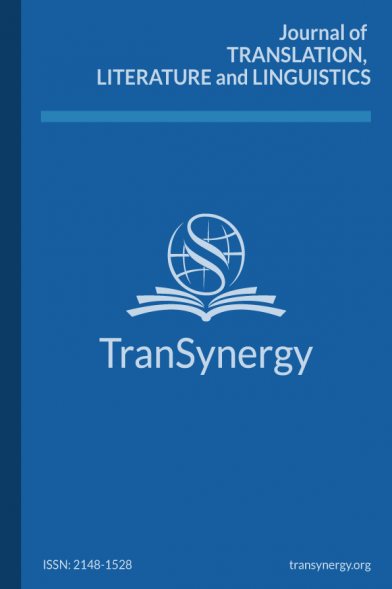“Intralingual Hijacking” As a Newly Coined Feminist Translation Strategy
feminist translation, hijacking, intralingual hijacking, manipulation, ideology
“Intralingual Hijacking” As a Newly Coined Feminist Translation Strategy
feminist translation, hijacking, intralingual hijacking, manipulation, ideology,
___
Ahmed, S. (2017). Living a feminist life. Duke University Press.
Berk Albachten, Ö. (2013). Intralingual translation as ‘modernization’ of the language: The Turkish case. Studies in Translation Theory and Practice, 21(2), 257-271.
Bozkurt, S. (2014). Touched translations in Turkey: A feminist translation approach. Moment Dergi, 1(1), 104-124.
Butler, J. (1990). Gender trouble: Feminism and the subversion of identity. New York: Routledge.
Chamberlain, L. (2000). Gender and the metaphorics of translation. Signs: Journal of Women in Culture and Society, 13(3), 454-472.
Dağabak, E. S. (2018). Reconstruction of ideal female image in fairy tales through translation strategies: The case of politically correct bedtime stories (Publication No. 511055) [Master’s Thesis, Gazi University]. YÖK Ulusal Tez Merkezi.
Derrida, J. (1967). Of grammatology. Johns Hopkins University Press.
Ergün, E. (2017). Translational beginnings and origin/izing stories: (Re)writing the history of the contemporary feminist movement in Turkey. In L. von Flotow, & F. Farahzad (Eds.). Translating women: Different voices and new horizons (pp. 41-55). Routledge.
Garner, J. F. (2011). Politically correct bedtime stories. Souvenir Press.
Godard, B. (1989). Theorizing feminist discourse / translation. Tessera, 6(Spring), 42-53.
Haslanger, S. (1995). Ontology and social construction. Philosophical Topics, 23(2), 95–125. doi: 10.5840/philtopics19952324
Hermans, T. (1985). The manipulation of literature: Studies in literary translation. Croom Helm.
Grimm, J., & Grimm, W. (2015, March 3). Grimm 26: Little Red Cap. Retrieved March 16, 2018, from University of Pittsburgh : https://www.pitt.edu/~dash/grimm026.html
Kimmel, M. S. (2000). The gendered society. Oxford University Press.
Millett, K. (2016). Sexual politics. Columbia University Press.
Lefevere, A. (1992). Translation, rewriting, and the manipulation of literary fame. Routledge.
Lüthi, M. (1986). The European folktale: Form and nature. Indiana University Press.
Perrault, C. (2003, September 21). Perrault: Little red riding hood. Retrieved March 2018, from University of Pittsburgh: http://www.pitt.edu/~dash/perrault02.html
Roy, A. (2003). War talk. South End Press.
Simon, S. (1996). Gender in translation: Cultural identity and the politics of transmission. Routledge
Snell-Hornby, M. (1988). Translation studies: An integrated approach. John Benjamins Publishing Company.
Toury, G. (2000). The nature and role of norms in translation. In L. Venuti (Ed.), The Translation Studies Reader (pp. 198-211). Routledge.
von Flotow, L. (1991). Feminist translation: Contexts, practices and theories. Traduire La Théorie, 4(2), 69-84.
von Flotow, L. (1997). Translation and gender: Translating in the “era of feminism”. (A. Pym, Ed.) University of Ottawa Press.
- ISSN: 2979-9503
- Yayın Aralığı: Yılda 2 Sayı
- Başlangıç: 19.12.2022
The Classification of Languages and Social Processes: A Historical Analysis of Genetic Links
The Historical Significance of Chinese Character Simplification
Food Culture in ELT Coursebooks: A Neglected Dimension
“Intralingual Hijacking” As a Newly Coined Feminist Translation Strategy
